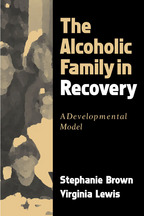The Alcoholic Family in Recovery
A Developmental Model
Stephanie Brown and Virginia Lewis
Paperbacke-bookprint + e-book
Paperback
orderAugust 19, 2002
ISBN 9781572308343
Price: $50.00318 Pages
Size: 6" x 9"
Copyright Date: 1999
Family relationships change dramatically when one or more members stops drinking. Far from offering a “quick fix” to family problems, in fact, the first years of sobriety are often marked by continuing tension that fuels marital stress, acting-out kids, and difficulties at work. This book explores the process of recovery from addiction as it affects the entire family, presenting an innovative model for understanding and treating families navigating this difficult period. The authors draw upon extensive clinical and research experience to demonstrate how families can be helped to regroup after abstinence, weather periods of emotional upheaval, and find their way to establishing a more stable, yet flexible, family system.
“This user-friendly text is a valuable addition to the area of research on the multi-dimensionality of alcoholism....Useful for clinicians, researchers, students, families, and individuals.”
—Criminal Justice Review
“[The authors] present a well-developed model of alcoholism recovery, refined through their many years of clinical experience with alcoholic families and adult children of alcoholics, and they illustrate its implications for therapeutic strategies with a rich variety of case histories....This very careful and comprehensive exposition of the developmental model of recovery and its application to clinical situations should be useful and instructive for therapists and clinical students.”
—Addiction
“Well organized and clearly written....The strength of this book lies in the authors' stating early and often their biases and beliefs regarding alcoholism and the path of family recovery....The fact that they based this book on the findings of a research project and not just their own clinical experience is refreshing....Brown and Lewis wrote this book with therapists in mind....They clearly point out the role for therapists and the tasks at each phase of the recovery process.”
—Journal of Family Psychotherapy
Table of Contents
I. Introduction1. What Happens When the Drinking Stops?
2. The Developmental Process of Recovery
II. Stories of Families in Recovery
3. Transition and Early Recovery:
The Corwins and the Turners
4. From Early Recovery to Ongoing Recovery:
The Hendersons and the Warners
III. A Framework for Assessment
5. Assessing Family Functioning: Domains of Experience
6. Stages of Recovery: Drinking, Transition, Early Recovery, and Ongoing Recovery
7. Factors That Influence Recovery
IV. A Developmental Model of Family Recovery
8. The Drinking Stage
9. Transition for Couples and Families
10. Early Recovery for Couples and Families
11. Ongoing Recovery for Couples and Families
Epilogue
About the Authors
Stephanie Brown, PhD, is a clinician, teacher, researcher, consultant, and author in the field of alcoholism. She founded the Alcohol Clinic at Stanford University Medical Center in 1977 and served as its director for 8 years. A Research Associate at the Mental Research Institute in Palo Alto, California, where she is Co-Director of the Family Recovery Project, Dr. Brown also maintains a private practice and directs the Addictions Institute in Menlo Park, California.Virginia Lewis, PhD, a licensed psychologist, educational psychologist, and marriage, family, and child counselor, is Co-Director of the Family Recovery Project and Senior Research Fellow at the Mental Research Institute. In addition to her full-time private practice, she gives lectures and workshops on the Family Recovery Project and is coordinating and analyzing test data for journal publications. She has coauthored and been awarded several research grants with associates at the Mental Research Institute over the past 20 years, and has lent her skills to a number of research projects.
Audience
Addictions treatment specialists, couple and family therapists, psychologists, psychiatrists, social workers, counselors, and nurses; advanced students in these areas.Serves as a primary or supplemental text for graduate-level courses on addictions treatment, family counseling and therapy, and social work with families.
